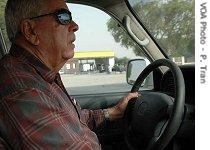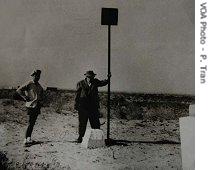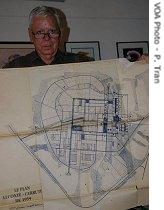-
(单词翻译:双击或拖选)
Nouakchott, Mauritania
13 July 2007
French engineer Jean Sahuc arrived in West Africa in the early 1950's to oversee1 the building of Mauritania's capital. Almost 50 years after he laid the first foundation stones in Nouakchott, Sahuc takes reporter Phuong Tran on a tour of the capital for her report on one of the oldest immigrant communities in Mauritania, the French. This report is one of a five-part series on immigrant communities in West Africa.
 |
| Jean Sahuc |
He has been retired3 from the French civil service for more than 10 years.
But even in retirement4, he is surrounded by multi-colored folders5 that carry plans for World Bank-funded schools he is helping6 to build.
The engineer says when he arrived in Mauritania in 1953, there was no airport, no agriculture, no local government employees or even a capital. The capital was located in St. Louis, Senegal.
Sahuc says he attended the signing ceremony when the capital was moved to its present location in 1958, two years before Mauritania gained independence from France.
 |
| French engineer Jean Sahuc laying first stone at government palace, circa 1960 in Nouakchott, Mauritania |
Sahuc points out traffic lanes added in 1970 to ease congestion7. But he says traffic has been a problem since the 1972 drought sent people fleeing to the capital in search of work.
Sahuc says, in the past, French families working in Mauritania stayed at least 10 years, some up to 20. Now, he says, the French do not stay as long.
He says it used to be easy to form long-term friendships with other French residents because they stayed longer in Mauritania. Sahuc says that since the French government limited the amount of time its civil servants can work in Mauritania to less than five years, the community is not as close.
 |
| Map of Nouakchatt before independence from France |
The total population of Mauritania is more than three million.
Even though the French foreign ministry says France is Mauritania's largest bilateral9 donor10, giving about $25 million every year, Sahuc says he thinks France has less influence than before because there are more investors11 from other countries.
He says 50 years ago, there were more than 400 French companies in Mauritania. The French embassy in Mauritania says there are now about a dozen.
Sahuc says despite 50 years in Nouakchott, he and his wife live much like they did in France, with a home garden and colorful flora12 he manages to keep alive in the middle of the desert.
He says the garden is his way of fighting back against the sand.
Sahuc says he continues to live in Mauritania because of the climate and the simple way of life. But even that is changing, he says.
He says he used to enjoy camping out in the desert among the sand dunes13, a common vacation in a country where most still live the nomadic14 life. But Sahuc says everyone seems to think only about making money now. He says it is hard to get away from that, even in the open desert.
 收听单词发音
收听单词发音
1
oversee

|
|
| vt.监督,管理 | |
参考例句: |
|
|
|
2
steering

|
|
| n.操舵装置 | |
参考例句: |
|
|
|
3
retired

|
|
| adj.隐退的,退休的,退役的 | |
参考例句: |
|
|
|
4
retirement

|
|
| n.退休,退职 | |
参考例句: |
|
|
|
5
folders

|
|
| n.文件夹( folder的名词复数 );纸夹;(某些计算机系统中的)文件夹;页面叠 | |
参考例句: |
|
|
|
6
helping

|
|
| n.食物的一份&adj.帮助人的,辅助的 | |
参考例句: |
|
|
|
7
congestion

|
|
| n.阻塞,消化不良 | |
参考例句: |
|
|
|
8
ministry

|
|
| n.(政府的)部;牧师 | |
参考例句: |
|
|
|
9
bilateral

|
|
| adj.双方的,两边的,两侧的 | |
参考例句: |
|
|
|
10
donor

|
|
| n.捐献者;赠送人;(组织、器官等的)供体 | |
参考例句: |
|
|
|
11
investors

|
|
| n.投资者,出资者( investor的名词复数 ) | |
参考例句: |
|
|
|
12
flora

|
|
| n.(某一地区的)植物群 | |
参考例句: |
|
|
|
13
dunes

|
|
| 沙丘( dune的名词复数 ) | |
参考例句: |
|
|
|
14
nomadic

|
|
| adj.流浪的;游牧的 | |
参考例句: |
|
|
|















